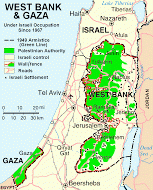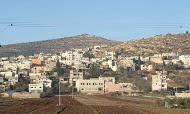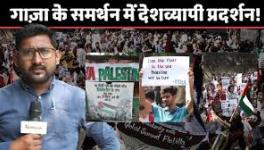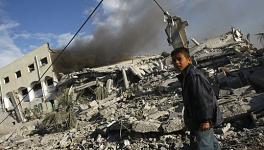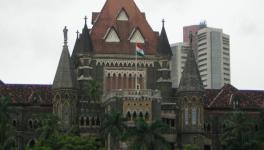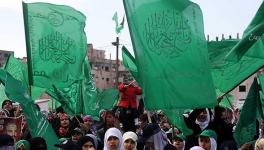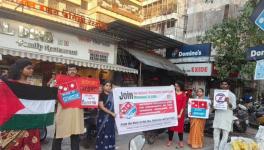Newsclick Special Feature from Palestine
Farmer Abu Jamal and the Zionist Fantasy of the Moses Tank.
On a clear sunny day in March, two members of the Newsclick Collective joined three Palestinian families in a visit to a village in the West Bank.
The three families are what the Israelis call “Arab citizens of Israel”. They live 50 km from Haifa, part of ’48 Palestine. The three Palestinian couples had brought their children along; the children were seeing the West Bank for the first time.
We drove to the village of Lubban, 20 km south of the city of Nablus in the northern part of the West Bank.
The settlements of Ma’ale Levona and Eli surround the village from above. International law rules these settlements in the occupied West Bank illegal.
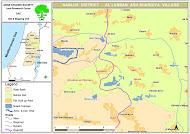 |
Ma’ale Levona – the name is the judaised version of Lubban -- was established on expropriated land by Hanan Porat, a prominent member of the Gush Emunim.
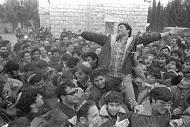 |
|
Porat raised on shoulders of his supporters in 1975 in Gush Emunim
|
The Gush Emunim, Hebrew for "Block of the Faithful", is a fundamentalist Zionist movement committed to establishing Jewish settlements in the West Bank, the Gaza Strip and the Golan Heights.
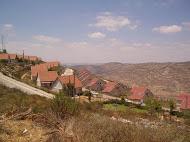 |
In what became Ma’ale Levona, “temporary” caravans were first placed on expropriated land; these caravans were, over time, replaced by fancy villas.
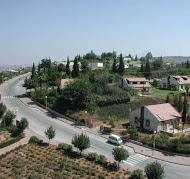 |
Eli was established in 1984 on Ali hilltop – the name Ali was judaised to Eli. With mobile caravans being added over a period of time, the settlement grew till it occupied seven hilltops belonging to Palestinian villages -- including Lubban.
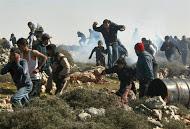 |
|
When settlers from Eli clashed with Palestinian villagers in the northern West Bank
on January 13, 2011, Israeli forces fire tear gas on the villagers. Jaafar Ashtiyeh
|
In 2005, Israeli occupation forces surrounded the colony with a “security belt” to provide “protection” for Eli. More land was confiscated from Lubban Village for this purpose. When the settlement’s wastewater treatment plant became dysfunctional, the wastewater was dumped on the lands of Lubban Village, destroying crops. The settlers regularly attack the villagers, especially during the olive harvest season.http://www.poica.org/editor/case_studies
We arrived in Lubban Village, the settlements of Ma’ale Levona and Eli above us on their hilltops. Our visit was to the home of a farmer, Khalid, also known as Abu Jamal, or Father of Jamal.
Farmer Abu Jamal and his family, like thousands of Palestinians in the West Bank, live under siege. Abu Jamal’s house, and what remains of his fields, are cut off from the rest of Lubban Village. The Israeli settlement above Abu Jamal’s house constitutes a daily threat to his house, his land, and the family’s safety.
The first thing we saw as we walked toward Abu Jamal’s house was an image of resistance at the entrance. The driveway was blocked with stones to keep the settlers away.
When we admired the door, Abu Jamal said it is a replacement. The old door was beautiful but the settlers took it away.
The settlers want the house and the land around it for a specific reason. To one side of the house is a small tank by what used to be a spring and a well.
Many Zionists believe that Moses once washed himself in this tank. The settlers above the village, as well as some Zionists from elsewhere, used to come here and wash themselves, says Abu Jamal, “to absolve themselves of their sins”.
Once Abu Jamal locked them in. Then he emptied the tank of water.
But still, Abu Jamal, said, “They badger me to give them the house and tank because they think it is their history. I said I would if they gave us Jerusalem.”
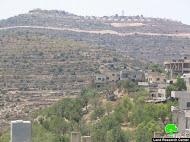 |
|
Photo of Ma’ale Levona from the Land Research Center, http://www.lrcj.org/Eng/site.php
|
The settlers from Ma’ale Levona did not give up. Once, when Abu Jamal was not home, the settlers came down, beat up his young sons, Jamal, Mohmin and Noor.
His wife, Umm Jamal, was stuck alone inside the house, not knowing what to do.
Abu Jamal had not given up either. He said he blocks the driveway with stones over and over again. He takes down the sign that this is a resort stop for Israelis every time it is put up. He keeps the “Moses tank” empty.
How do Abu Jamal and his family manage? The women grow some vegetables in the backyard.
Umm Jamal and her daughter Dalal invited the women into the spare but neatly kept house.
Dalal is married and lives in the village, but comes to her parents’ home every day with her little daughter. Dalal said softly, “What do we do, they harass us.” By “they” she meant the settlers. Umm Jamal said nothing, just smiled shyly to make us feel at home.
All talk of settlers and struggles was forgotten as we ate lunch together. The group from ’48 Palestine unpacked a simple but delicious picnic lunch. Abu Jamal contributed fresh fruit and a salad of farm fresh vegetables. The children from ’48 Palestine ran around, exploring every tree, every muddy inch of a Palestine they had only heard about before.
After lunch, Abu Jamal took us around what remains of his land. He showed us the hills that used to belong to him and his family.
He pointed to the hills – where Eli is – and said they stole two springs.
We saw the old olive press, locked up and no longer used. It reminded us of the difficulty of harvesting the olive trees the villagers of Lubban still have. It also bore testimony to the loss of land and livelihood.
But Abu Jamal is a stubborn man. He knows this is his land, his home, and he will not give up. He cultivates what remains of his land. Volunteers from Palestinian and international groups help him with farm work every two weeks.
Abu Jamal said goodbye to us with fruits and greens from his field.
Text and photos: The Newsclick Team
(Special thanks to Abu Jamal and his family, and the activists of Stop the Wall (www.stopthewall.org)
Get the latest reports & analysis with people's perspective on Protests, movements & deep analytical videos, discussions of the current affairs in your Telegram app. Subscribe to NewsClick's Telegram channel & get Real-Time updates on stories, as they get published on our website.









